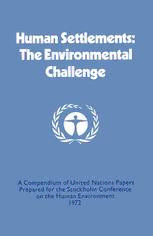
Human Settlements: The Environmental Challenge: A Compendium of United Nations Papers Prepared for the Stockholm Conference on the Human Environment 1972 PDF
Preview Human Settlements: The Environmental Challenge: A Compendium of United Nations Papers Prepared for the Stockholm Conference on the Human Environment 1972
HUMAN SETTLEMENTS: THE ENVIRONMENTAL CHALLENGE HUMAN SETTLEMENTS: The Environmental Challenge A Compendium of United Nations Papers Prepared for the Stockholm Conference on the Human Environment 1972 CENTRE FOR HOUSING, BUILDING AND PLANNING UNITED NATIONS DEPARTMENT OF ECONOMIC AND SOCIAL AFFAIRS Palgrave Macmillan ©United Nations 1974 Softcover reprint of the hardcover 1st edition 1974 978-0-333-14071-0 All rights reserved. No part of this publication may be reproduced or transmitted, in any form or by any means, without permission. First published 1974 by THE MACMILLAN PRESS LTD London and Basingstoke Associated companies in New York Dublin Melbourne Johannesburg and Madras ISBN 978-1-349-01649-5 ISBN 978-1-349-01647-1 (eBook) DOI 10.1007/978-1-349-01647-1 The twin challenges posed by development and environment also offer us a double opportunity: to shape man's economic and social activities so that they harmonise as never before with the constraints imposed by nature; and to make nature serve the needs of all men. UTHANT Contents Foreword XI Preface Xlll Acknowledgement XVI Part One 1 The Problem 3 Man and his Environment A Question of Perspective Special Problems of Developing Countries The Human Settlement Resolving the Conflicts 2 Evolution of Human Settlements 13 Population Growth and Urbanisation The Pattern of Rural Settlement Migration and Urban Growth Transitional Settlements Central City Problems The Pull of Primate Cities Conflicts in the Settled Environment Liquid and Solid Wastes Mental Health 3 A Comprehensive Approach 49 Conventional Responses to Urban Problems Health Aspects of Planning City Planning Influencing Migration Patterns Rural Development New Towns and Growth Poles Distribution of Industry Comprehensive Planning Vll Contents Vlll 4 The Process of Implementation 73 A Programme of Reform Problems of Methodology The Administrative System Legal, Fiscal and Institutional Machinery Problems in Developing Countries Public Support Research, Education and Training Part Two 5 Housing 101 The Residential Environment The House and the Neighbourhood Locational Factors Social Involvement Progressive Improvement in Transitional Areas A Practical Approach Finding the Money International Aid 6 Industry 120 Industry and the Urban Environment Industrial Location The Building Industry Policy Issues 7 Leisure 132 Open Space in Urban Areas Recreation Planning and Management Planning for Tourists 8 Infrastructure 142 The Vital Role of Water Treatment and Supply Sewage Disposal Solid Wastes 9 Transport 153 Transport Systems Managing the Motor Car Contents IX Public Transport Transport Planning New Technologies 10 Social and Cultural Aspects 167 The Symbolic Role of the City Centre Interactions and Conflicts Historic Areas Citizenship and Participation Appendix (Conference Declaration and Recommend ations, and General Assembly Resolutions) 175 Notes 206 Foreword Man's intervention in nature has engendered conflict between the natural and man-made environments. Only in this century has the resulting damage exceeded nature's capacity to redress the balance. Unprecedented population growth, industrialisation pursued almost as an end in itself and unregulated urbanisation have brought the man-made and natural environments into conflict to such a degree that not only is sound economic and social development endangered, but also the physical, social, aesthetic and spiritual well-being of man is jeopardised. Again and again we are reminded that controls are slipping out of his hands and that man's creations might ultimately consume him. Fortunately, mankind is awakening to these challenges, as is evident in part from the United Nations Conference on the Human Environment in Stockholm, Sweden, in 1972. It brought together leading scientists and statesmen, defined the basic issues and recommended a course of action for the developing as well as the industrialised countries. The Conference rightly noted that development and environ mental protection are not mutually opposed and that the developing countries, while sharing the experience of the industrialised societies, would do well to avoid environmental errors. I am happy to note that this book describes the essential problems and possible solutions concerning human settle ments as conceived by the professional community and considered by representatives of Governments at the Stock holm Conference, as well as by the United Nations General Assembly at its twenty-seventh session in 1972. This volume, I trust, will advise and inspire experts, administrators and community leaders alike in discharging their unavoidable responsibility to redirect the forces that shape human settlements, to bring the man-made elements of the environment into closer harmony with the natural X1 xu Foreword elements, to prevent further environmental impairment and to improve the quality of human life. Technology as well as political and social organisation may be profoundly affected in meeting fully the demands for environmentally safe urban and rural settlements with decent shelter and community facilities. It is easy to see why if one ponders the implications of just two tasks which face mankind. First, it is necessary to build every year on the average until the end of this century the equivalent of sixty-seven new cities of one million inhabitants each in order to accommodate the increased urban population of the world. Second, over 1000 million new dwellings must be con structed by the end of this century to house the peoples of the world. We must not demur in evolving new solutions; otherwise, in the words of Francis Bacon, 'He that will not apply new remedies must expect new evils'. PIDLIPPE DE SEYNES Under-Secretary-General for Economic and Social Affairs
